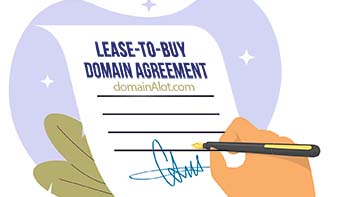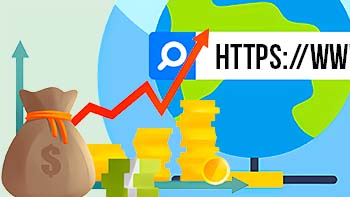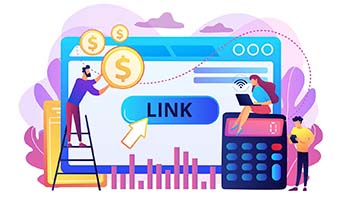The Domain Dilemma: Why Owners Are Losing Money to Commission-Based Marketplaces
How major registrars built a system that profits from your digital assets

Around ten years ago the average cost of a domain registration was between $5 and $7. The renewal fee was the same. If you chose to renew a domain for a longer period, say 5, or even 10 years, then you were also offered a discount. I guess it was a form of "thank you" for paying upfront. These were good days, and it was nice to own a domain. The feeling that one day, my little web shop side hustle would eventually generate enough revenue to get out of the rat race.
Last week, after the fourth reminder informing me that I was in danger of losing my domain, although let's face it with grace periods there's very little danger of that unless I make a decision not to renew it, but then these emails are not really for my benefit are they? There an automated sales call to action. Anyway, I digress, the point is, I logged in and went to renew my domain, and was asked to pay $19.99! Let me just repeat that... A domain I registered for $4.99, now costs 4 TIMES the amount to simply maintain.
It's the same domain. Nothing has changed. I haven't moved address. My domain hasn't either. There's no need to update any contact information. The domain still points to the same IP address and the same server, but for some reason it now costs 4 times the price to simply keep whatever settings are stored in a single row in some database somewhere. Why?
I can't be alone in asking this question because there's no explanation. No reason given for why my domain now costs 400% more to own than it did a decade ago?
I'm not sure if offended or disgusted is the right word to describe how I felt, except to say that I immediately decided to transfer and checked the prices of the usual suspects, or "The Big 5" as they're often called. Sadly, and may I say much to my dismay, they were ALL doing the exact same thing. If you transfer to another registrar you get the first year for around $7 to $10, but then it's $20 and in some cases much more the year after, and thereafter. Coincidence? Me thinks not. I smell a conspiracy, or at the very least, an operating practice that has been taken as the norm, and driven at our expense.
Market Manipulation
I remember when eBay first started. There were no auctions then. You simply paid to list an item and your hoped someone would buy it. Somewhere along the way, someone realised that an auction was a better way of driving up the price of an item. Supply and demand, and all that. But there was no real incentive to host auctions unless you are able to profit from them, right? In the real world, auctioneers take a standard commission for each lot. The owners of eBay, however, decided to buy PayPal. So, the more people paid for an item, the more money went into the ecosystem and if you also made PayPal the default payment solution for the platform, then not only did you earn money from people listing items, you earned more money from people paying for items. A win, win I think it's called.
There's nothing new in market manipulation. It happens all the time in any market segment. When Amazon first started offering books, it was a great way to find publications you simply couldn't get anywhere else. As they expanded into digital publishing, and actual publishing itself, authors were given a platform upon which to sell their creative work. Print on demand they called it, and it was an excellent idea... initially. Time passed, and authors discovered that Amazon naturally needed to cover their publishing costs first, but since they own, or rather, are the publishers, why were they so high? To add insult to injury, Amazon then take a large commission from each sale before determining indirectly what an author's book can, or rather will be sold for. Isn't that an incredible manipulation of the market?
As time continued to progress, tools like "The Royalty Calculator" were released to help authors evaluate the price of their books. But really, the calcualtor was to educate authors into understanding what they couldn't sell their books for, and by that, what I mean is, show authors the absolute minimum Amazon wanted in terms profit before they would even consider listing a title. Oh, and by the way, all this happens BEFORE the author can even calculate a dime from their work.
Imagine a scenario where the average 300 page trade-pocket book in a category sells for $8.99. Well, Amazon says no. you can't sell a book that cheap, not if Amazon is to earn a profit. Drop into your local Target or Walmart and you'll see those 300 page trade-pocket romance novels going for $3 a pop. So, why does Amazon need 3 times the retail price of a product just to produce it? Especially when they have the volume and are the world's largest producer of a product. Anyway, let's not get caught up in greed or market dominance, the ever-trusting author who has just spent a year of their life pouring their heart out onto these pages has no choice other than to use The Royalty Calculator. Sadly, discovering that pricing their book at $9.50, which again, is 3 times what a brick and mortar store with physical costs charges, leaves the author with an expected royalty of just $0.15. And why do this? Because Amazon offers the author global coverage, and access to the only real market. Except at this price, The Royalty Calculator also informs the author that they will not make a dime from international markets like the UK, Germany, France, or Spain etc. because apparently Amazon need $9.50 to print 300 pages? So what are they using? Golden ink?
What's equally as interesting, is to look at the opposite end of the scale. I.e. the author who decides that they cannot survive from $0.15 per sale and so decide to increase the value of their book from $9.50, to say $12.50. They do this believing that now they would earn $0.15 plus a further $3.00 per sale... except it doesn't work that way. In fact, the higher the price of the book, the more money Amazon take in commission, and at $12.50 the author still earns less than $3 per sale, not the expected $3.65. But there is an even more interesting dynamic here, and that is by the author attempting to increase the price of their book, they effectively price themselves out of the market, as other authors in their segment are already pressed to sell at the absolute minimum, and the author must fall in line if they should expect to sell anything at all. And $0.15 is better than nothing, right? While all the time, Amazon continue to profit, and more importantly, protect that profit by controlling the pricing of items being offered on their platform to ensure profitability.
History Repeats Itself
No business operates without cost, and just as Amazon must pay for their apparently hand-woven paper, domain registrars have something called ICANN fees. So, it must surely be due to these that the cost of domain renewal has skyrocketed in recent years?
On closer examination, it turns out that ICANN charges registrars just $0.18 for every domain registration, transfer, or renewal. Now, let me repeat that. EIGHTEEN CENTS. Not $3 or $5 but $0.18. Not $0.18 to register a domain and then $10 to renew it, but EIGHTEEN CENTS. PERIOD. So, where have all these "costs" come from? Why has it become so expensive to own a domain? Or to renew one? Oh, hang on... I think I've already covered this. It's called market manipulation, or perhaps an abuse of market power is more apt?
Domain registrars, like the Amazons and eBays and so many others before them, have simply understood that there's no point having a piece of the cake when you can have it all.
It wasn't so many years ago that registrars were happy to simply sell and transfer domains. They could offer an array of additional products and services through dedicated and shared hosting, mail services, SSL certificates, and so on. That's all good, but these are all fixed monthly or annual fees, and they all have additional costs. Whether it be server farms, technical support staff, electricity etc. they all take a bite out of the cake. Surely there was a way to profit in the way that those giants before them did, because surely it was that way of profiteering that made them the giants of business they are today?
Well, it turns out the answer was there all along. And the juciest cakes of all are simply domains. You see, when you own a domain, it's not all that different from writing a book or selling an item on eBay. It's something that's yours, and something that's yours has a value that's not only actual, but emotional as well.
Let me give you an example, say, ten years ago I wanted to started a cake shop called SweetTreats.com. Now I'm convinced that Sweet Treats is going to be a success. It's completely emotional and completely my opinion because I've never actually owned a bakery, or even baked a cake before. Years pass and I understand that my career as a baker is probably never going to happen so I decide to sell SweetTreats.com. But I know it's valuable. I know it. And I've been paying increasing amounts of money each year to a registrar to renew the domain which only further confirms my belief. So, now I am in no doubt that a domain I registered and have sat with for years without any other market interest is worth at least $1,000, probably much, much more... it has to be. I decide to sell it, and somehow, the universe smiles on me because a would-be baker has a dream of starting a bakery called Sweet Treats at that exact same time (what are the odds) and he or she buys the domain from me. They pay the registrar a few dollars to transfer the domain, and the registrar pays their ICANN fee. I walk away with my $1,000. The baker has the domain. The registrar has a new customer. Everyone is happy. Everyone except the registrar that is. So what's their beef?
A registrar has eyes on access to new registrations and transfers, and it doesn't take NASA to start seeing that there are literally tens, if not hundreds of thousands of domain transfers made every day. Taking a few dollars for a domain that was sold for $1,000 is nothing more than crumbs, and if you multiply that by the volume of daily transfers, then we're looking at an awful lot of dough (excuse the pun).
So, registrars began buying up domain marketplaces, and what was once a landscape of independent sites became a culture of corporate monopolisation.
If There's A Will, They Will Pay
With their marketplaces in hand, it was time to revolutionise the process of domain ownership. And while the registrars didn't have their own payment systems, they could certainly learn a thing or two from those that did. After all, why sell a domain when you can auction it, eBay taught us that, and while we're at it, why not even demand membership fees for the ability to be able to access the marketplace? And if authors were willing to pay 30% commission for the sale of their books, then why shouldn't a domain owner be willing to pay 30% for the sale of their domains?
But there were still a lot of variables left to chance, and those marketplaces weren't cheap to acquire. So while renewal fees could increase each year, there was still a need for greater profit, and one way to get there was of course in the "valuation" of the domains themselves.
Where Amazon have their Royalty Calculator, the registrars began to offer their "Appraisal Tools." Automated scripts that would help domain owners understand the "true" value of their digital assets by simply being able to type their domain name into a text field! Now, if that's not a wonder of modern technology, then I don't know what is?
The cake was all but iced... except there was still the possibility of third-party involvement and where domain brokers were once independent individuals, with no vested interest other than the fact that they were only paid after selling a domain on the domain owners behalf. Now, the registrars believed that domain owners should be willing to pay a flat fee in advance to a "broker" who will send an email and inform the owner that they are on the case. No refunds if they are unable to sell of course, but you should trust that they are able to... oh, and in the event they can't then it's most likely because the domain owner didn't pay for the additional domain promotion package and parking page deal to help potential buyers.
based upon what the registrars believed they were worth. Hmmm... not unlike Amazon determining thew value of a book?
It's quite incredible when you sum up the development of registrars in recent years and the impact they have had on reshaping and controlling the domain ownership market. There was a time when registrars were simply agents. Accredited ICANN agents licensed to register domains. But ICANN merely governs the technical standards, they do not impose strict controls on marketplace practices or pricing models, and registrars have been able to establish infrastructure, brand trust, and buyer traffic that now makes it difficult for any other form of competition. In fact, I would go so far as to say that until domain owners themselves support developing platforms like domainAlot.com, that empower sellers and foster a more competitive and fair marketplace, then the future of domain ownership looks bleak, at least in the short-term, and will continue to be one of ever-greater expense and ever-increased registrar profit. Perhaps time is the light at the end of the tunnel, because even eBay learned you can't have all the cake and eat it which is why listing items is now free. It took decades and the rise of competitors like Shopify and Etsy to force them there, but for domain owners with extensive portfolios, the cost of annual renewals alone means that time is a luxury they can ill afford.





